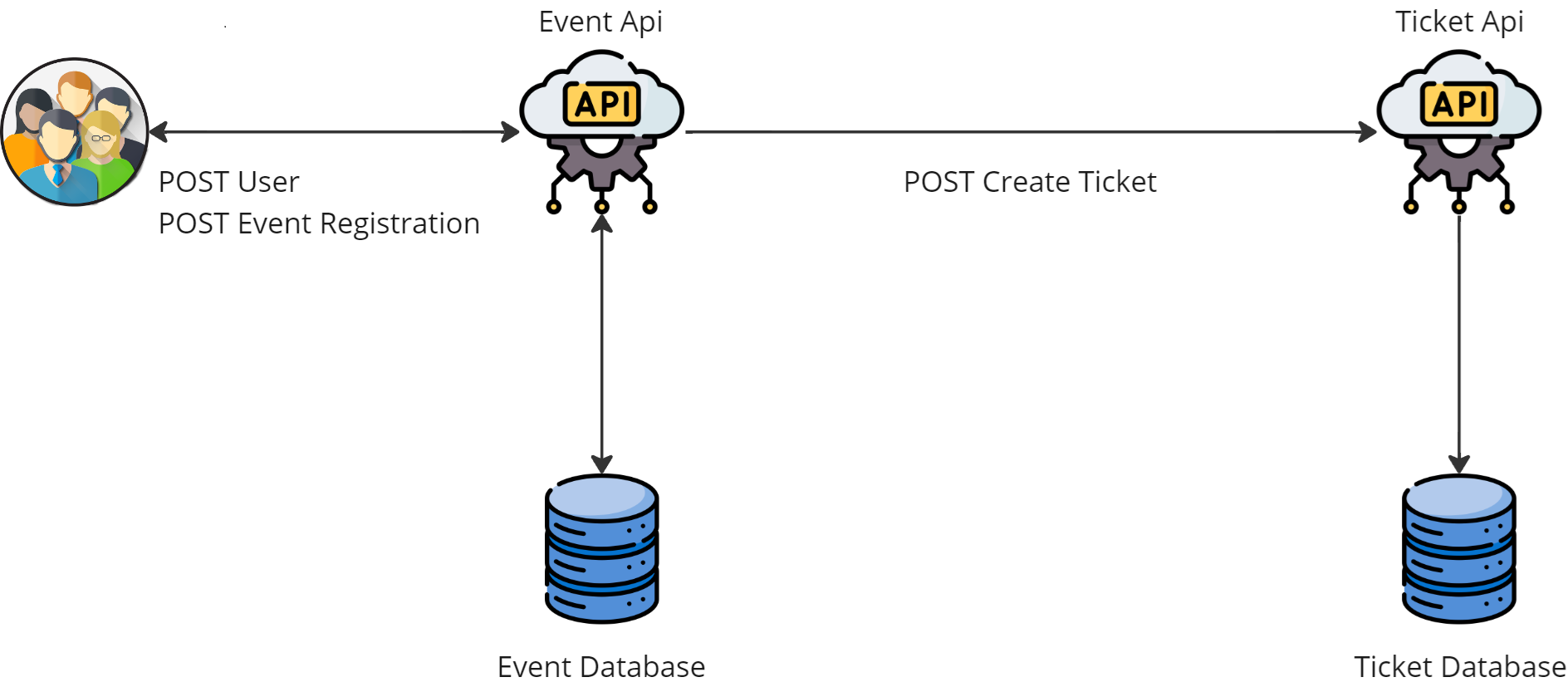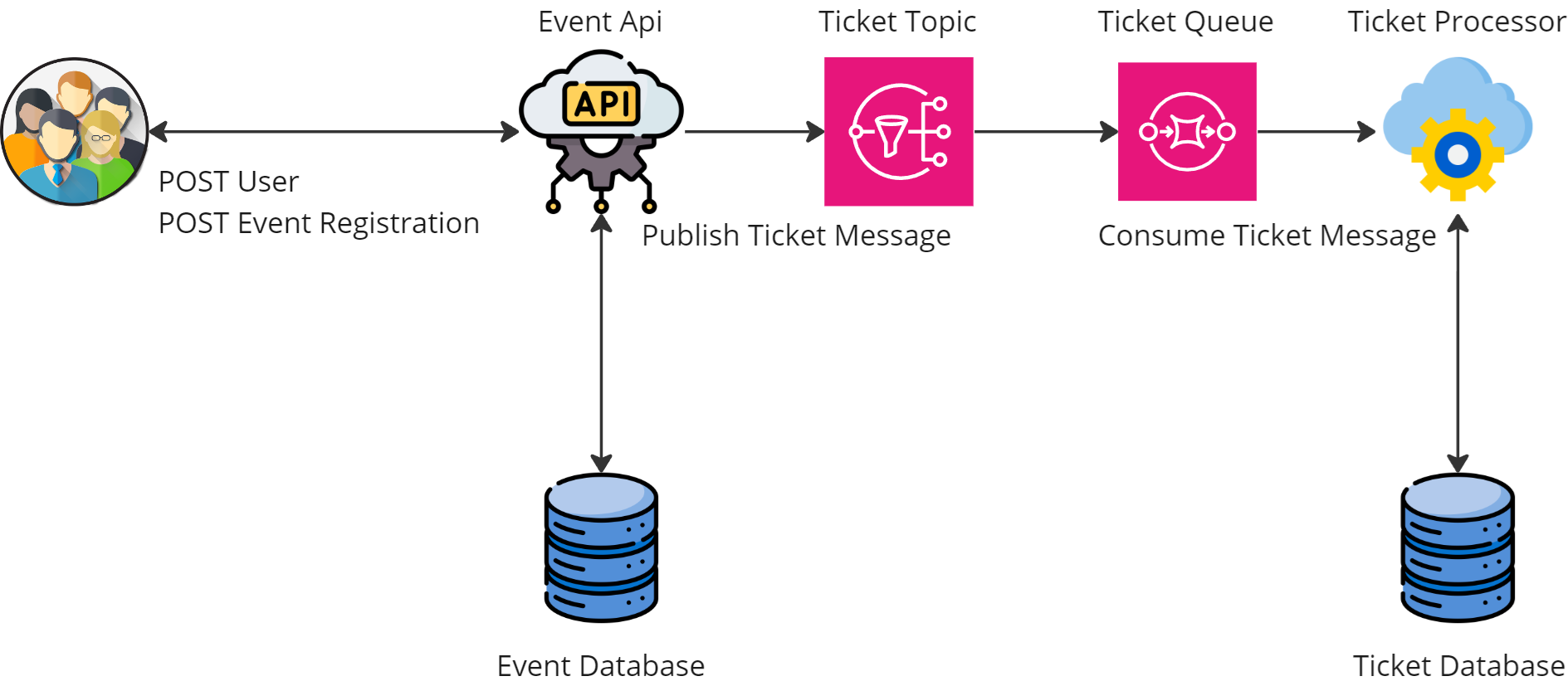This repository hosts a demonstration from the "Tracing the Future" presentation, delivered at Devnot's .NET Conference 2024. The project showcases practical implementations of OpenTelemetry to improve observability within .NET applications, and uses .NET Aspire with AWS and LocalStack for local development.
The demo includes two main scenarios: HTTP and SNS/SQS, highlighting synchronous and asynchronous communication between microservices.
# Prerequisites: .NET 9 SDK, Docker Desktop
git clone https://github.com/Blind-Striker/dotnet-otel-aspire-localstack-demo
cd dotnet-otel-aspire-localstack-demo
dotnet run --project local/aspire/OpenTelemetry.Demo.AspireHostThen:
- Open Aspire Dashboard (auto-launches in browser)
- Navigate to EventApi Swagger UI (URL shown in terminal)
- Create users → Register to events → View distributed traces in Aspire Dashboard!
This demo addresses common challenges in modern .NET cloud development:
- ✅ Local AWS Development - LocalStack integration via LocalStack.Aspire.Hosting eliminates AWS costs and network latency
- ✅ Observable by Default - Consolidated OpenTelemetry setup with ASP.NET Core, HttpClient, AWS SDK, and AWS.Messaging instrumentation
- ✅ Aspire Orchestration - AppHost manages all services and containers; no docker-compose needed
- ✅ Infrastructure as Code - Embedded AWS CDK stack provisions SNS topics and SQS queues, automatically wired to services
- ✅ Modern AWS SDK - Upgraded to AWS SDK for .NET v4 and LocalStack.NET v2 for consistent client configuration
- ✅ Two Integration Modes - Compare synchronous (HTTP) vs asynchronous (SNS/SQS) distributed tracing patterns
This demo includes two main scenarios:
Demonstrates tracing a synchronous flow where services communicate directly over HTTP. This scenario highlights the real-time interactions between microservices.
Demonstrates asynchronous communication using AWS SNS for notifications and SQS for message queuing. This scenario highlights the decoupling of services and the benefits of message-based communication.
- OpenTelemetry.Demo.AspireHost: Aspire Host project automatically launches and configures all necessary .NET services along with Docker containers.
- OpenTelemetry.Demo.Local.Database: Responsible for creating the database and seeding it with initial data. It supports both MSSQL and PostgreSQL databases. See configuration section for more details.
- OpenTelemetry.Demo.EventApi: Manages user creation, event listing, and registration to events. Following a user registration, it initiates ticket creation requests either through direct HTTP calls or via SNS+SQS. See Interacting with the API and configuration sections for more details.
- OpenTelemetry.Demo.TicketApi: Processes ticket creation post-event registration when operating over HTTP. It receives ticket creation requests from EventApi and processes them accordingly.
- OpenTelemetry.Demo.TicketProcessor: Processes ticket creation post-event registration when operating over SNS+SQS. It listens to the SQS queue for ticket creation requests and processes them accordingly.
- AWS CDK in AppHost: An embedded CDK stack provisions the
TicketTopic(SNS) andTicketQueue(SQS) and wires their outputs into the AppHost so services can publish/consume without manual setup.
- Aspire: A cloud-ready stack for building observable, distributed applications in .NET.
- LocalStack: Provides a local development environment for AWS cloud stack, allowing for full functionality without requiring actual AWS services.
- OpenTelemetry: An open-source observability framework for cloud-native software, providing metrics, logs, and traces for applications.
- AWS.Messaging: Facilitates message processing with AWS services like SQS, SNS, and EventBridge.
- LocalStack.NET: A .NET client for LocalStack, offering a simplified wrapper for aws-sdk-net that configures endpoints to use LocalStack, facilitating local AWS cloud development. Version 2.0 provides consistent client configuration and enhanced AWS SDK v4 compatibility for streamlined development workflows.
- .NET Aspire Integrations for LocalStack: Integration library that enables first-class LocalStack management from .NET Aspire (used here via
LocalStack.Aspire.Hosting). - OneOf: Implements F# style discriminated unions in C#, simplifying complex conditional logic.
- Serilog.Sinks.OpenTelemetry: A Serilog sink transforms Serilog events into OpenTelemetry LogRecords and sends them to an OTLP (gRPC or HTTP) endpoint.
Follow these steps to set up the project locally:
Ensure the following prerequisites are met before proceeding with the local setup:
- .NET 9.0: Install from official .NET download page
- .NET Aspire: Uses the new NuGet SDK model for simplified setup. See .NET Aspire setup and tooling for more information.
- Container Runtime: An OCI-compliant container runtime like Docker Desktop or Podman is necessary. For more information, refer to the Container Runtime documentation.
- IDE or Code Editor: While optional, it's beneficial to use:
- Visual Studio 2022 version 17.11 or higher.
- Visual Studio Code.
- JetBrains Rider with the .NET Aspire plugin installed.
The OpenTelemetry.Demo.AspireHost is an Aspire Host project that launches and configures all necessary .NET services, including EventApi, TicketApi, and TicketProcessor, as well as essential containers for MSSQL, PostgreSQL, and LocalStack. Simply running this project is sufficient to initialize and operate the entire application environment.
In the launchSettings.json of the OpenTelemetry.Demo.AspireHost project (or via environment variables at runtime), two keys drive the composition:
EventSystem:DatabaseType— Database engine:npgsql(PostgreSQL, default) orsqlserver(Microsoft SQL Server).EventSystem:TicketIntegration— Integration mode between EventApi and ticketing services:aws(SNS+SQS, default) orhttp(direct HTTP to TicketApi).
Defaults are set to PostgreSQL + AWS. When set to aws, AppHost runs the TicketProcessor worker and wires SNS/SQS via the embedded CDK stack. When set to http, AppHost runs the TicketApi and wires EventApi’s HttpClient via Aspire service discovery.
Environment variables can be provided using the standard .NET double-underscore format. For example (PowerShell):
$env:EventSystem__DatabaseType = "npgsql"
$env:EventSystem__TicketIntegration = "aws"
dotnet run --launch-profile "http"The OpenTelemetry.Demo.AspireHost project can be run either directly through your IDE or via the command line:
- Open your IDE (Visual Studio, Visual Studio Code, JetBrains Rider, etc.).
- Navigate to the OpenTelemetry.Demo.AspireHost project.
- Start the project using the relevant IDE's run/debug functionality.
- Open a terminal and navigate to the
OpenTelemetry.Demo.AspireHostproject directory. - To run the application with HTTPS (requires configured developer certificates), execute:
dotnet run --launch-profile "https"If you encounter issues with HTTPS, ensure that your developer certificates are properly installed and configured. For more information, see dotnet-dev-certs.
- Alternatively, to run the application with HTTP
dotnet run --launch-profile "http"Once the services are up:
- The Aspire dashboard will be accessible, providing an overview of service health and metrics.
- You can also access the EventApi's Swagger UI to interact with the API directly. The URL to the Swagger UI will be displayed in the terminal or in the IDE's output window.
- LocalStack is managed by the AppHost via
LocalStack.Aspire.Hosting; no separate docker-compose is required. - The AppHost synthesizes an AWS CDK stack that creates:
TicketTopic(SNS) andTicketQueue(SQS)- A subscription that routes topic messages to the queue
- Necessary queue policy for SNS to publish
- Topic ARN and Queue URL are exported and injected into services through Aspire references.
- Create Users:
- Use the
POST /userendpoint to create new users. This can be done via the Swagger UI or using a tool like Postman.
- Use the
- Register Users to Events:
- With users created, use the
POST /event/registerendpoint to register these users to events. Events are pre-seeded and available for registration. - In
awsmode, EventApi publishes a message to SNS; TicketProcessor consumes from SQS and creates the ticket. - In
httpmode, EventApi calls TicketApi directly over HTTP to create the ticket.
- With users created, use the
- Access the Aspire dashboard to review logs, distributed traces, and metrics to gain insights into the application's performance and behavior.
- The dashboard provides a comprehensive view of the system's operations, making it easier to troubleshoot issues or understand the flow of data through your application.
- Ensure that all configurations in
launchSettings.jsonare set according to your local setup needs. - Experiment with different configurations to see how the system behaves under various conditions, especially when switching between database types or integration strategies.
- Add Automated Tests - Implement unit, integration, and Aspire-specific tests to validate distributed scenarios
- Database Migrations - Replace
EnsureCreated()with proper EF Core migrations for production-safe schema management - Database Separation - Transition from a single database setup to distinct databases per service (users, events, tickets) for better isolation and scalability
- Error Handling - Improve global exception handling and add retry policies for AWS operations
- Observability Tools Integration - Add examples for external OTLP collectors (Jaeger, Prometheus, Zipkin)
- Detailed Setup Instructions - Extend documentation to include AWS CDK customization guidance and troubleshooting
- Additional Scenarios - Demonstrate saga patterns, compensation logic, or CQRS with event sourcing
Additionally, the localstack-dotnet organization will develop more extensive example projects that leverage technologies such as Aspire, OpenTelemetry, AWS, and LocalStack.NET.
Contributions to this project are welcome! Feel free to submit issues or pull requests to improve the project.
This project is released under the MIT License

